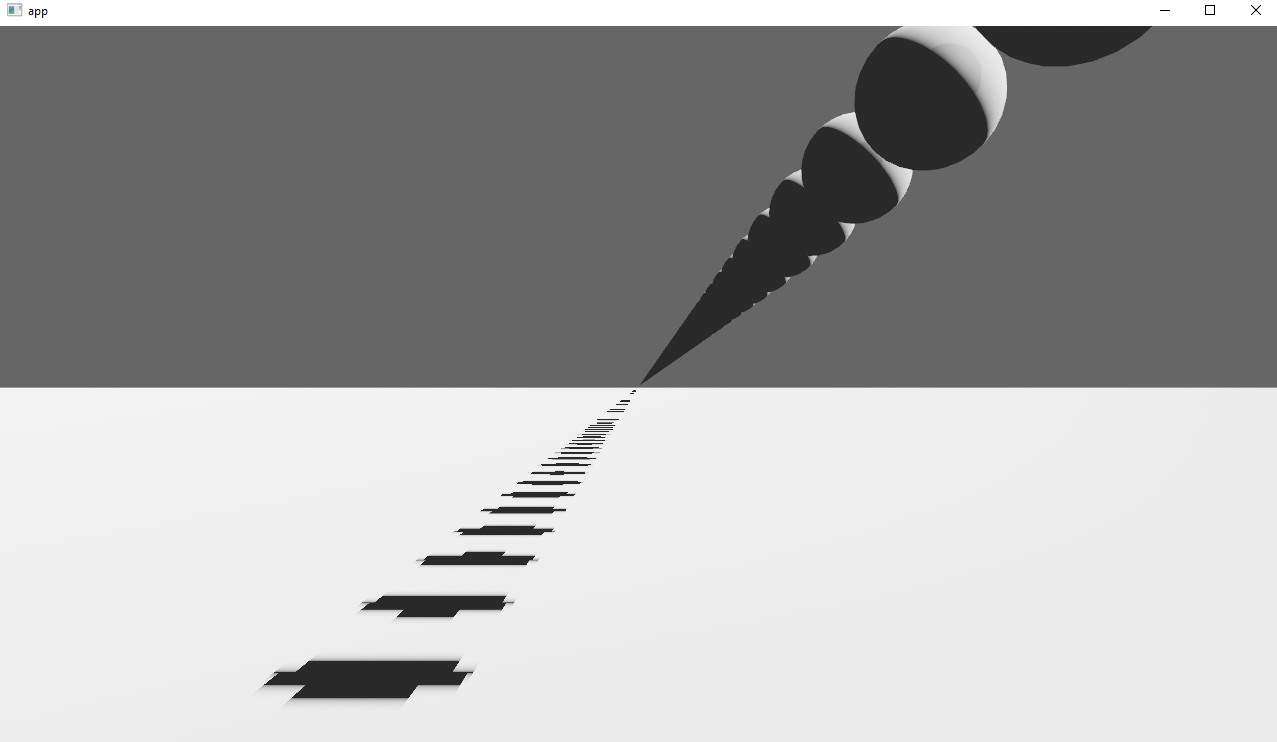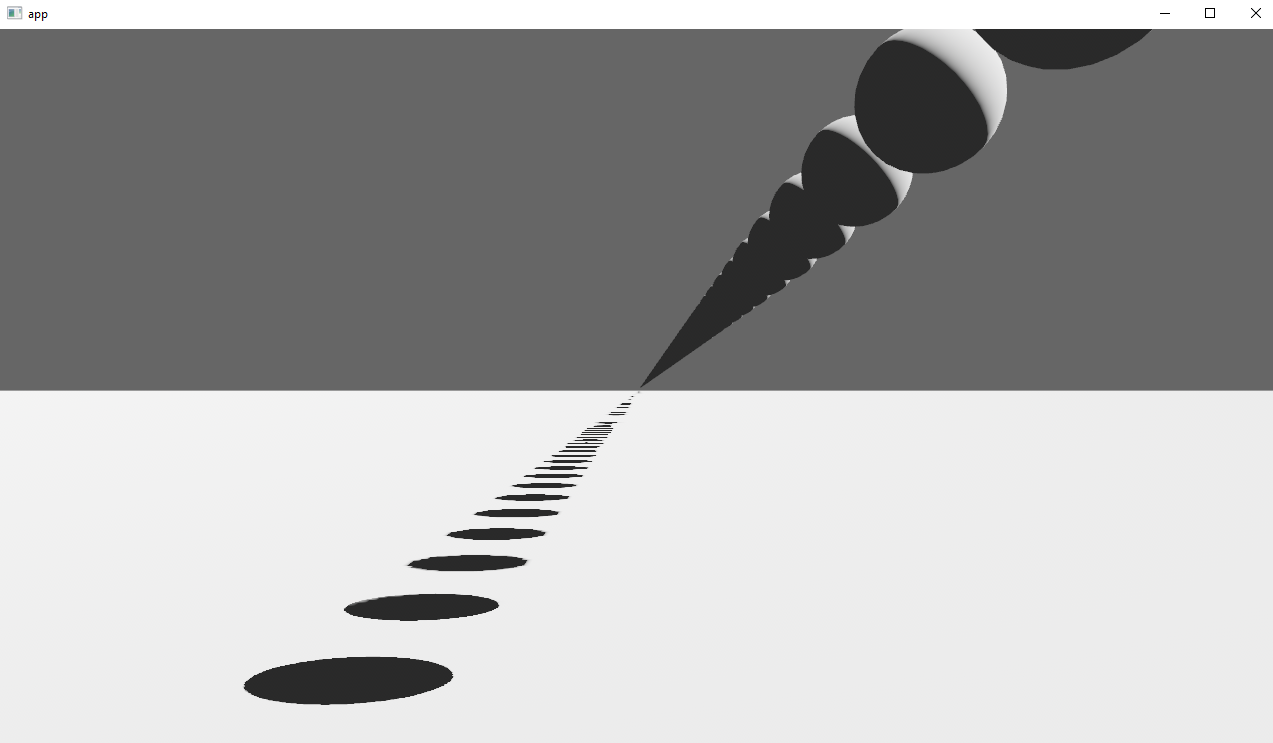mirror of
https://github.com/bevyengine/bevy
synced 2025-01-10 12:18:58 +00:00
Co-authored-by: Robert Swain <robert.swain@gmail.com> # Objective Implements cascaded shadow maps for directional lights, which produces better quality shadows without needing excessively large shadow maps. Fixes #3629 Before  After  ## Solution Rather than rendering a single shadow map for directional light, the view frustum is divided into a series of cascades, each of which gets its own shadow map. The correct cascade is then sampled for shadow determination. --- ## Changelog Directional lights now use cascaded shadow maps for improved shadow quality. ## Migration Guide You no longer have to manually specify a `shadow_projection` for a directional light, and these settings should be removed. If customization of how cascaded shadow maps work is desired, modify the `CascadeShadowConfig` component instead.
331 lines
13 KiB
Rust
331 lines
13 KiB
Rust
#[cfg(target_pointer_width = "16")]
|
|
compile_error!("bevy_render cannot compile for a 16-bit platform.");
|
|
|
|
extern crate core;
|
|
|
|
pub mod camera;
|
|
pub mod color;
|
|
pub mod extract_component;
|
|
mod extract_param;
|
|
pub mod extract_resource;
|
|
pub mod globals;
|
|
pub mod mesh;
|
|
pub mod pipelined_rendering;
|
|
pub mod primitives;
|
|
pub mod render_asset;
|
|
pub mod render_graph;
|
|
pub mod render_phase;
|
|
pub mod render_resource;
|
|
pub mod renderer;
|
|
pub mod settings;
|
|
mod spatial_bundle;
|
|
pub mod texture;
|
|
pub mod view;
|
|
|
|
use bevy_hierarchy::ValidParentCheckPlugin;
|
|
pub use extract_param::Extract;
|
|
|
|
pub mod prelude {
|
|
#[doc(hidden)]
|
|
pub use crate::{
|
|
camera::{Camera, OrthographicProjection, PerspectiveProjection, Projection},
|
|
color::Color,
|
|
mesh::{shape, Mesh},
|
|
render_resource::Shader,
|
|
spatial_bundle::SpatialBundle,
|
|
texture::{Image, ImagePlugin},
|
|
view::{ComputedVisibility, Msaa, Visibility, VisibilityBundle},
|
|
};
|
|
}
|
|
|
|
use bevy_window::{PrimaryWindow, RawHandleWrapper};
|
|
use globals::GlobalsPlugin;
|
|
pub use once_cell;
|
|
|
|
use crate::{
|
|
camera::CameraPlugin,
|
|
mesh::MeshPlugin,
|
|
render_resource::{PipelineCache, Shader, ShaderLoader},
|
|
renderer::{render_system, RenderInstance},
|
|
settings::WgpuSettings,
|
|
view::{ViewPlugin, WindowRenderPlugin},
|
|
};
|
|
use bevy_app::{App, AppLabel, Plugin, SubApp};
|
|
use bevy_asset::{AddAsset, AssetServer};
|
|
use bevy_ecs::{prelude::*, system::SystemState};
|
|
use bevy_utils::tracing::debug;
|
|
use std::{
|
|
any::TypeId,
|
|
ops::{Deref, DerefMut},
|
|
};
|
|
|
|
/// Contains the default Bevy rendering backend based on wgpu.
|
|
#[derive(Default)]
|
|
pub struct RenderPlugin {
|
|
pub wgpu_settings: WgpuSettings,
|
|
}
|
|
|
|
/// The labels of the default App rendering stages.
|
|
#[derive(Debug, Hash, PartialEq, Eq, Clone, StageLabel)]
|
|
pub enum RenderStage {
|
|
/// Extract data from the "app world" and insert it into the "render world".
|
|
/// This step should be kept as short as possible to increase the "pipelining potential" for
|
|
/// running the next frame while rendering the current frame.
|
|
Extract,
|
|
|
|
/// A stage for applying the commands from the [`Extract`] stage
|
|
ExtractCommands,
|
|
|
|
/// Prepare render resources from the extracted data for the GPU.
|
|
Prepare,
|
|
|
|
/// Create [`BindGroups`](crate::render_resource::BindGroup) that depend on
|
|
/// [`Prepare`](RenderStage::Prepare) data and queue up draw calls to run during the
|
|
/// [`Render`](RenderStage::Render) stage.
|
|
Queue,
|
|
|
|
// TODO: This could probably be moved in favor of a system ordering abstraction in Render or Queue
|
|
/// Sort the [`RenderPhases`](crate::render_phase::RenderPhase) here.
|
|
PhaseSort,
|
|
|
|
/// Actual rendering happens here.
|
|
/// In most cases, only the render backend should insert resources here.
|
|
Render,
|
|
|
|
/// Cleanup render resources here.
|
|
Cleanup,
|
|
}
|
|
|
|
/// Resource for holding the extract stage of the rendering schedule.
|
|
#[derive(Resource)]
|
|
pub struct ExtractStage(pub SystemStage);
|
|
|
|
/// The simulation [`World`] of the application, stored as a resource.
|
|
/// This resource is only available during [`RenderStage::Extract`] and not
|
|
/// during command application of that stage.
|
|
/// See [`Extract`] for more details.
|
|
#[derive(Resource, Default)]
|
|
pub struct MainWorld(World);
|
|
|
|
/// The Render App World. This is only available as a resource during the Extract step.
|
|
#[derive(Resource, Default)]
|
|
pub struct RenderWorld(World);
|
|
|
|
impl Deref for MainWorld {
|
|
type Target = World;
|
|
|
|
fn deref(&self) -> &Self::Target {
|
|
&self.0
|
|
}
|
|
}
|
|
|
|
impl DerefMut for MainWorld {
|
|
fn deref_mut(&mut self) -> &mut Self::Target {
|
|
&mut self.0
|
|
}
|
|
}
|
|
|
|
pub mod main_graph {
|
|
pub mod node {
|
|
pub const CAMERA_DRIVER: &str = "camera_driver";
|
|
}
|
|
}
|
|
|
|
/// A Label for the rendering sub-app.
|
|
#[derive(Debug, Clone, Copy, Hash, PartialEq, Eq, AppLabel)]
|
|
pub struct RenderApp;
|
|
|
|
impl Plugin for RenderPlugin {
|
|
/// Initializes the renderer, sets up the [`RenderStage`](RenderStage) and creates the rendering sub-app.
|
|
fn build(&self, app: &mut App) {
|
|
app.add_asset::<Shader>()
|
|
.add_debug_asset::<Shader>()
|
|
.init_asset_loader::<ShaderLoader>()
|
|
.init_debug_asset_loader::<ShaderLoader>();
|
|
|
|
let mut system_state: SystemState<Query<&RawHandleWrapper, With<PrimaryWindow>>> =
|
|
SystemState::new(&mut app.world);
|
|
let primary_window = system_state.get(&app.world);
|
|
|
|
if let Some(backends) = self.wgpu_settings.backends {
|
|
let instance = wgpu::Instance::new(backends);
|
|
let surface = primary_window.get_single().ok().map(|wrapper| unsafe {
|
|
// SAFETY: Plugins should be set up on the main thread.
|
|
let handle = wrapper.get_handle();
|
|
instance.create_surface(&handle)
|
|
});
|
|
|
|
let request_adapter_options = wgpu::RequestAdapterOptions {
|
|
power_preference: self.wgpu_settings.power_preference,
|
|
compatible_surface: surface.as_ref(),
|
|
..Default::default()
|
|
};
|
|
let (device, queue, adapter_info, render_adapter) =
|
|
futures_lite::future::block_on(renderer::initialize_renderer(
|
|
&instance,
|
|
&self.wgpu_settings,
|
|
&request_adapter_options,
|
|
));
|
|
debug!("Configured wgpu adapter Limits: {:#?}", device.limits());
|
|
debug!("Configured wgpu adapter Features: {:#?}", device.features());
|
|
app.insert_resource(device.clone())
|
|
.insert_resource(queue.clone())
|
|
.insert_resource(adapter_info.clone())
|
|
.insert_resource(render_adapter.clone())
|
|
.init_resource::<ScratchMainWorld>();
|
|
|
|
let pipeline_cache = PipelineCache::new(device.clone());
|
|
let asset_server = app.world.resource::<AssetServer>().clone();
|
|
|
|
let mut render_app = App::empty();
|
|
let mut extract_stage =
|
|
SystemStage::parallel().with_system(PipelineCache::extract_shaders);
|
|
// Get the ComponentId for MainWorld. This does technically 'waste' a `WorldId`, but that's probably fine
|
|
render_app.init_resource::<MainWorld>();
|
|
render_app.world.remove_resource::<MainWorld>();
|
|
let main_world_in_render = render_app
|
|
.world
|
|
.components()
|
|
.get_resource_id(TypeId::of::<MainWorld>());
|
|
// `Extract` systems must read from the main world. We want to emit an error when that doesn't occur
|
|
// Safe to unwrap: Ensured it existed just above
|
|
extract_stage.set_must_read_resource(main_world_in_render.unwrap());
|
|
// don't apply buffers when the stage finishes running
|
|
// extract stage runs on the render world, but buffers are applied
|
|
// after access to the main world is removed
|
|
// See also https://github.com/bevyengine/bevy/issues/5082
|
|
extract_stage.set_apply_buffers(false);
|
|
|
|
// This stage applies the commands from the extract stage while the render schedule
|
|
// is running in parallel with the main app.
|
|
let mut extract_commands_stage = SystemStage::parallel();
|
|
extract_commands_stage.add_system(apply_extract_commands.at_start());
|
|
render_app
|
|
.add_stage(RenderStage::Extract, extract_stage)
|
|
.add_stage(RenderStage::ExtractCommands, extract_commands_stage)
|
|
.add_stage(RenderStage::Prepare, SystemStage::parallel())
|
|
.add_stage(RenderStage::Queue, SystemStage::parallel())
|
|
.add_stage(RenderStage::PhaseSort, SystemStage::parallel())
|
|
.add_stage(
|
|
RenderStage::Render,
|
|
SystemStage::parallel()
|
|
// Note: Must run before `render_system` in order to
|
|
// processed newly queued pipelines.
|
|
.with_system(PipelineCache::process_pipeline_queue_system)
|
|
.with_system(render_system.at_end()),
|
|
)
|
|
.add_stage(
|
|
RenderStage::Cleanup,
|
|
SystemStage::parallel().with_system(World::clear_entities.at_end()),
|
|
)
|
|
.init_resource::<render_graph::RenderGraph>()
|
|
.insert_resource(RenderInstance(instance))
|
|
.insert_resource(device)
|
|
.insert_resource(queue)
|
|
.insert_resource(render_adapter)
|
|
.insert_resource(adapter_info)
|
|
.insert_resource(pipeline_cache)
|
|
.insert_resource(asset_server);
|
|
|
|
let (sender, receiver) = bevy_time::create_time_channels();
|
|
app.insert_resource(receiver);
|
|
render_app.insert_resource(sender);
|
|
|
|
app.insert_sub_app(RenderApp, SubApp::new(render_app, move |app_world, render_app| {
|
|
#[cfg(feature = "trace")]
|
|
let _render_span = bevy_utils::tracing::info_span!("extract main app to render subapp").entered();
|
|
{
|
|
#[cfg(feature = "trace")]
|
|
let _stage_span =
|
|
bevy_utils::tracing::info_span!("stage", name = "reserve_and_flush")
|
|
.entered();
|
|
|
|
// reserve all existing app entities for use in render_app
|
|
// they can only be spawned using `get_or_spawn()`
|
|
let total_count = app_world.entities().total_count();
|
|
|
|
assert_eq!(
|
|
render_app.world.entities().len(),
|
|
0,
|
|
"An entity was spawned after the entity list was cleared last frame and before the extract stage began. This is not supported",
|
|
);
|
|
|
|
// This is safe given the clear_entities call in the past frame and the assert above
|
|
unsafe {
|
|
render_app
|
|
.world
|
|
.entities_mut()
|
|
.flush_and_reserve_invalid_assuming_no_entities(total_count);
|
|
}
|
|
}
|
|
|
|
{
|
|
#[cfg(feature = "trace")]
|
|
let _stage_span =
|
|
bevy_utils::tracing::info_span!("stage", name = "extract").entered();
|
|
|
|
// extract
|
|
extract(app_world, render_app);
|
|
}
|
|
}));
|
|
}
|
|
|
|
app.add_plugin(ValidParentCheckPlugin::<view::ComputedVisibility>::default())
|
|
.add_plugin(WindowRenderPlugin)
|
|
.add_plugin(CameraPlugin)
|
|
.add_plugin(ViewPlugin)
|
|
.add_plugin(MeshPlugin)
|
|
.add_plugin(GlobalsPlugin);
|
|
|
|
app.register_type::<color::Color>()
|
|
.register_type::<primitives::Aabb>()
|
|
.register_type::<primitives::CascadesFrusta>()
|
|
.register_type::<primitives::CubemapFrusta>()
|
|
.register_type::<primitives::Frustum>();
|
|
}
|
|
|
|
fn setup(&self, app: &mut App) {
|
|
if let Ok(render_app) = app.get_sub_app_mut(RenderApp) {
|
|
// move the extract stage to a resource so render_app.run() does not run it.
|
|
let stage = render_app
|
|
.schedule
|
|
.remove_stage(RenderStage::Extract)
|
|
.unwrap()
|
|
.downcast::<SystemStage>()
|
|
.unwrap();
|
|
|
|
render_app.world.insert_resource(ExtractStage(*stage));
|
|
}
|
|
}
|
|
}
|
|
|
|
/// A "scratch" world used to avoid allocating new worlds every frame when
|
|
/// swapping out the [`MainWorld`] for [`RenderStage::Extract`].
|
|
#[derive(Resource, Default)]
|
|
struct ScratchMainWorld(World);
|
|
|
|
/// Executes the [`Extract`](RenderStage::Extract) stage of the renderer.
|
|
/// This updates the render world with the extracted ECS data of the current frame.
|
|
fn extract(app_world: &mut World, render_app: &mut App) {
|
|
render_app
|
|
.world
|
|
.resource_scope(|render_world, mut extract_stage: Mut<ExtractStage>| {
|
|
// temporarily add the app world to the render world as a resource
|
|
let scratch_world = app_world.remove_resource::<ScratchMainWorld>().unwrap();
|
|
let inserted_world = std::mem::replace(app_world, scratch_world.0);
|
|
render_world.insert_resource(MainWorld(inserted_world));
|
|
|
|
extract_stage.0.run(render_world);
|
|
// move the app world back, as if nothing happened.
|
|
let inserted_world = render_world.remove_resource::<MainWorld>().unwrap();
|
|
let scratch_world = std::mem::replace(app_world, inserted_world.0);
|
|
app_world.insert_resource(ScratchMainWorld(scratch_world));
|
|
});
|
|
}
|
|
|
|
// system for render app to apply the extract commands
|
|
fn apply_extract_commands(world: &mut World) {
|
|
world.resource_scope(|world, mut extract_stage: Mut<ExtractStage>| {
|
|
extract_stage.0.apply_buffers(world);
|
|
});
|
|
}
|